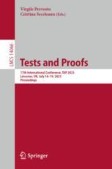Search
Search Results
-
From Felicitous Models to Answer Set Programming
Felicitous models were defined by Kit Fine in 1987 for the purpose of describing the semantics of negation in the programming language Prolog. They...
-
Correctness and Completeness of Programming Instructions for Traffic Circulation
In the present article we exploit the logical notions of correctness and completeness to provide an analysis of some fundamental problems that can be...
-
The Effect of Pair Programming on Code Maintainability
Software maintainability is an important key aspect in software development life cycle. It has a huge impact on the time, effort, and cost. This...
-
Computing and Programming in Context—Introduction
In a society where computers have become ubiquitous, it is necessary to develop a broader understanding of the nature of computing and programming,...
-
‘Selective Programming’: Response to ‘From Felicitous Models to Answer Set Programming’ by V. Lifschitz
I make use of the truthmaker framework in providing a selective semantics for programs with disjunction and compare it to the minmalist semantics.
-
Satisfiability, Lattices, Temporal Logic and Constraint Logic Programming on Intervals
This essay narrates some of the influences that Alasdair Urquhart has had on computer science at the intersection of automated theorem proving,...
-
Foo, Bar, Baz…: The Metasyntactic Variable and the Programming Language Hierarchy
This article argues that the English-language nonsense words “foo,” “bar,” “baz,” and others in a more or less standardized sequence of so-called...

-
Getting machines to do your dirty work
Autonomous systems are machines that can alter their behavior without direct human oversight or control. How ought we to program them to behave? A...
-
Programming for Corpus Linguistics
This chapter discusses the important role of programming in corpus linguistics. The chapter opens with a history of programming in the field of...
-
Reciprocal Influences Between Proof Theory and Logic Programming
The topics of structural proof theory and logic programming have influenced each other for more than three decades. Proof theory has contributed the...

-
Programming Away Human Rights and Responsibilities? “The Moral Machine Experiment” and the Need for a More “Humane” AV Future
Dilemma situations involving the choice of which human life to save in the case of unavoidable accidents are expected to arise only rarely in the...
-
On Giving Meanings to Programs
In a short section on the semantics of programs within his discussion of program correctness, Primiero seems to endorse the received view on the...

-
Programming Infinite Machines
For infinite machines that are free from the classical Thomson’s lamp paradox, we show that they are not free from its inverted-in-time version. We...

-
"I wonder if I'm being [a] Karen”: Analyzing rural–urban farmer network building
Farmers, especially those within historically underserved populations, utilize networks to access educational training, community support, and market...

-
Rescuing Relief in Remote Management and Programming: Using a Duty of Care Transfer Review to Assess the Accountability of Humanitarian Interventions
For humanitarian organizations, the concept of accountability shapes both strategy and operations. Guidance concerning the application of various...
-
Machine Ethics: Do Androids Dream of Being Good People?
Is ethics a computable function? Can machines learn ethics like humans do? If teaching consists in no more than programming, training,...

-
(Towards a) Statistical Probabilistic Lazy Lambda Calculus
We study the desiderata on a model for statistical probabilistic programming languages. We argue that they can be met by a combination of traditional...
-
A Study of Technological Intentionality in C++ and Generative Adversarial Model: Phenomenological and Postphenomenological Perspectives
This paper aims to highlight the life of computer technologies to understand what kind of ‘technological intentionality’ is present in computers...

-
Testing Languages with a Languages-as-Databases Approach
Language testing is an important element in the cycle of a programming language development. A part of these tests aim at determining features such...
-
Reductive Logic, Proof-Search, and Coalgebra: A Perspective from Resource Semantics
The reductive, as opposed to deductive, view of logic is the form of logic that is, perhaps, most widely employed in practical reasoning. In...
